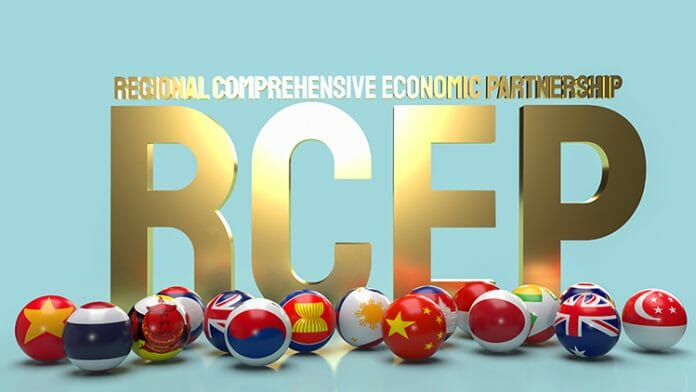With the mandate given by the Cabinet to issue Malaysia’s Instrument of Ratification (IOR) of the Regional Comprehensive Economic Partnership (RCEP) Agreement, Malaysia is now poised to be the 12th RCEP signatory to implement the Agreement.
With the submission, the RCEP Agreement will enter into force after 60 days of the submission and will enter into force on 18 March 2022. With this latest submission of IOR to the ASEAN Secretariat as the Depositary of RCEP, Malaysia will join the eleven other signatory countries, namely, Singapore, China, Japan, Brunei Darussalam, Cambodia, Lao PDR, Thailand, Viet Nam, Australia, New Zealand, and South Korea have completed the ratification process.
Currently, RCEP is the largest Free Trade Agreement in the world, covering 15 countries with 2.2 billion or nearly a third (29.5%) of the world’s population, representing US$25.8 trillion or 29.4% of the world’s GDP based on World Bank’s 2019 data. It bears stressing that RCEP is a testament to efforts to strengthen not only the multilateral trading system but advance regional economic integration and uphold the development agenda of the World Trade Organisation.
Within ASEAN, Malaysia is expected to be the largest beneficiary of the RCEP agreement in terms of gains in exports, with a projected US$200 million increase. According to a report by UNCTAD published on 15 December 2021, these gains will result from tariff elimination and reduction for merchandise goods, including the facilitation of export and import of goods among the RCEP countries. Furthermore, service providers including e-commerce will be able to enjoy greater market access in terms of cross border supply and establishing a commercial presence in the RCEP
markets.
The pandemic has underscored the paramount importance of international trade and cooperation as well as the inter-linkages of regional supply chains. In this regard, RCEP would be a key enabler for Malaysia in revitalising the domestic and international business activities, post-pandemic. Business communities, from large to small scale entrepreneurs are encouraged to take advantage of the vast investment opportunities and greater participation in regional and global value chains presented by this mega-trade agreement. As a trading nation, Malaysia will continue to be an open economy, with business-friendly and pragmatic policies that foster a conducive investment climate in the country.









